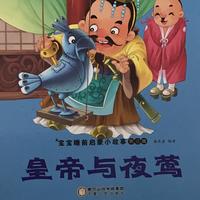皇帝 与 夜莺
Император||Соловей
l'empereur|et|rossignol
emperor|with|nightingale
Kaiser|und|Nachtigall
imperador||
Emperor and Nightingale
El emperador y el ruiseñor
L'empereur et le rossignol
皇帝とナイチンゲール
O Imperador e o Rouxinol
Император и соловей
皇帝 与 夜莺
Der Kaiser und die Nachtigall
皇帝 的 后 花园 里 住着 一只 声音 极其 美妙 的 夜莺 ,全世界 的 旅行家 都 会 赞扬 他 。
Kaiser|possessives Partikel|hinter|Garten|in|wohnt|eine|Stimme|äußerst|wunderbar|possessives Partikel|Nachtigall|die ganze Welt|possessives Partikel|Reisende|alle|werden|loben|sie
An emperor's nightingale lives in the emperor's back garden, and travellers around the world praise him.
皇帝の裏庭には素晴らしい声のナイチンゲールが住んでおり、世界中の旅人が彼を称賛しました。
No jardim das traseiras do Imperador, vive um rouxinol com uma voz extremamente maravilhosa, que todos os viajantes do mundo elogiam.
Im Hintergarten des Kaisers lebte eine Nachtigall mit einer äußerst schönen Stimme, die von allen Reisenden auf der Welt gelobt wurde.
皇帝 知道 后 ,命令 奴仆 找到 这 只 夜莺 ,当 这 只 夜莺 唱起 歌 时 ,皇帝 和 大臣 们 都 感动 得 哭 了 。
Kaiser|wusste|danach|befahl|Diener|finden|diese|Zähleinheit|Nachtigall|als|diese|Zähleinheit|Nachtigall|anfing zu singen|Lied|Zeit|Kaiser|und|Minister|Pluralpartikel|alle|gerührt|Partikel|weinten|Vergangenheitsmarker
After the emperor knew, he ordered his servant to find the nightingale. When the nightingale sang a song, the emperor and the ministers were moved to tears.
Quando o Imperador soube, ordenou aos servos que encontrassem este rouxinol; quando este rouxinol começou a cantar, o Imperador e os ministros ficaram tão emocionados que choraram.
Als der Kaiser davon erfuhr, befahl er seinen Dienern, diese Nachtigall zu finden. Als die Nachtigall zu singen begann, waren der Kaiser und die Minister so berührt, dass sie weinten.
一天 , 日本 人 给 皇帝 送 了 一 只 假 夜莺 , 于是 , 真 夜莺 飞走 了 。
One day, the Japanese gave the emperor a fake nightingale, so the real nightingale flew away.
Um dia, um japonês deu ao imperador um falso rouxinol, então, o verdadeiro rouxinol voou embora.
Eines Tages schickten die Japaner dem Kaiser eine falsche Nachtigall, und so flog die echte Nachtigall davon.
皇帝 只能 每天 听 这 只 假 夜莺 唱 同一 首 歌 。
Kaiser|kann nur|jeden Tag|hören|diese|nur|falsche|Nachtigall|singen|das gleiche|Zählerwort|Lied
The emperor could only listen to the fake nightingale singing the same song every day.
皇帝はニセナイチンゲールが毎日同じ歌を歌うのを聞くことしかできませんでした。
O imperador só podia ouvir esse falso rouxinol cantar a mesma canção todos os dias.
Der Kaiser konnte jeden Tag nur das gleiche Lied von der falschen Nachtigall hören.
后来 假 夜莺 坏 了 ,一年 只能 唱 一次 。
später|falsch|Nachtigall|kaputt|Zustandänderungspartikel|ein Jahr|nur|singen|einmal
Later|fake|nightingale|bad|(past tense marker)|one year|only can|sing|once
|||||um ano|||
Then the fake nightingale broke down and could only sing once a year.
その後、ニセナイチンゲールが故障し、年に一度しか歌えなくなりました。
Depois, o falso rouxinol quebrou e só pôde cantar uma vez por ano.
Später wurde die falsche Nachtigall kaputt und konnte nur einmal im Jahr singen.
皇帝 病倒 了 ,他 看到 死神 要 将 他 带走 ,很 想 最后 再 听 一次 夜莺 唱歌 ,可是 ,无论 他 怎么 哀求 ,假 夜莺 一动不动 。
Kaiser|krank|Zustandänderung|er|sah|Tod|will|ihn|ihn|mitnehmen|sehr|wollte|zuletzt|wieder|hören|einmal|Nachtigall|singen|aber|egal|er|wie|flehte|falsch|Nachtigall|rührte sich nicht
The emperor fell ill. He saw Death want to take him away. He wanted to hear Nightingale sing one last time, but no matter how he begged, the fake Nightingale remained motionless.
皇帝は病気になり、死が彼を連れ去ろうとしているのを見たとき、最後にもう一度ナイチンゲールの歌を聞きたかったのですが、いくら懇願してもニセナイチンゲールは動きませんでした。
O imperador ficou doente, e quando viu a Morte se aproximando para levá-lo, ele desejou ouvir o canto da cotovia mais uma vez. No entanto, não importava o quão desesperadamente ele implorasse, a cotovia falsa não se movia.
Der Kaiser wurde krank und als er sah, dass der Tod ihn mitnehmen wollte, wünschte er sich sehr, noch einmal die Nachtigall singen zu hören, aber egal wie sehr er flehte, die falsche Nachtigall rührte sich nicht.
这时 ,真 夜莺 特意 来 为 皇帝 唱 了 首 歌 。
zu diesem Zeitpunkt|wirklich|Nachtigall|absichtlich|kommen|für|Kaiser|singen|Vergangenheitsmarker|ein|Lied
At this time, the true nightingale came here to sing a song for the emperor.
この時、真のナイチンゲールが皇帝のために歌を歌いに来ました。
Nesse momento, a verdadeira cotovia veio especialmente para cantar uma canção para o imperador.
In diesem Moment kam die echte Nachtigall extra, um für den Kaiser ein Lied zu singen.
皇帝 很 感动 ,病 也好 了 。
|||болезнь|тоже выздоровел|
Kaiser|sehr|bewegt|Krankheit|auch besser|Zustandänderungspartikel
the Emperor||moved|illness|also|
||||também|
The emperor was very moved, and he recovered from his illness.
皇帝は非常に感動し、彼の病気は治りました。
O imperador ficou muito emocionado e sua doença foi curada.
Der Kaiser war sehr berührt, und seine Krankheit war geheilt.
他 要 报答 夜莺 , 可 夜莺 说 : “ 我 不 需要 报答 , 你 的 眼泪 就 是 最好 的 回报 。 ”
He wanted to repay the nightingale, but the nightingale said, "I don't need to repay, your tears are the best return."
彼はナイチンゲールに恩返しをしたかったが、ナイチンゲールは「恩返しはいらない、君の涙が一番の恩返しだ」と言った。
Ele quer recompensar a rouxinol, mas o rouxinol diz: "Eu não preciso de recompensa, suas lágrimas são a melhor recompensa."
Er wollte die Nachtigall belohnen, aber die Nachtigall sagte: „Ich brauche keine Belohnung, deine Tränen sind die beste Belohnung.“
SENT_CWT:9r5R65gX=7.71 PAR_TRANS:gpt-4o-mini=1.81
de:9r5R65gX
openai.2025-02-07
ai_request(all=13 err=0.00%) translation(all=10 err=0.00%) cwt(all=146 err=23.97%)

